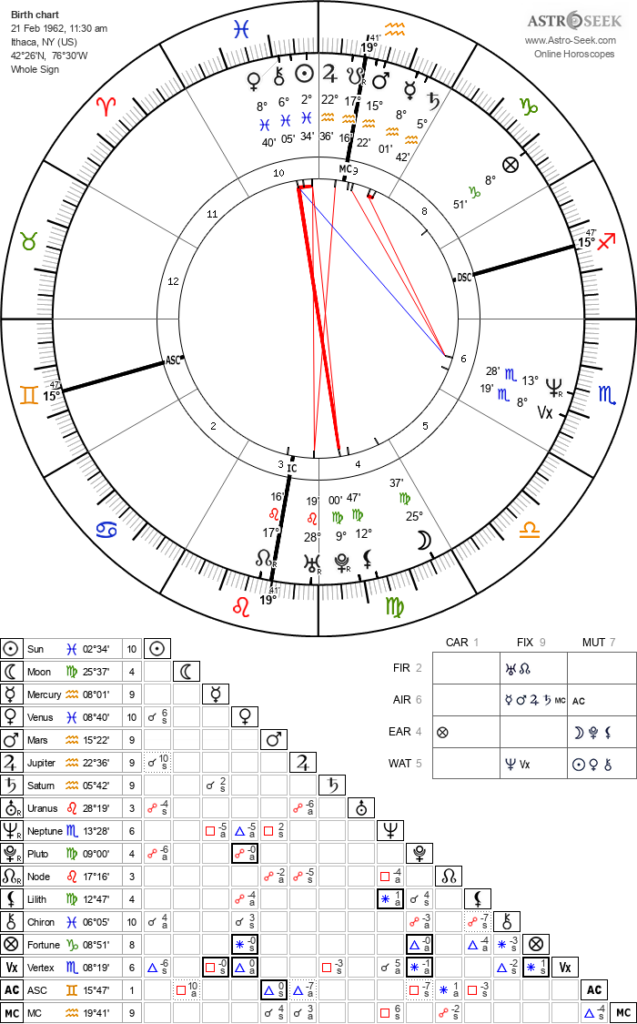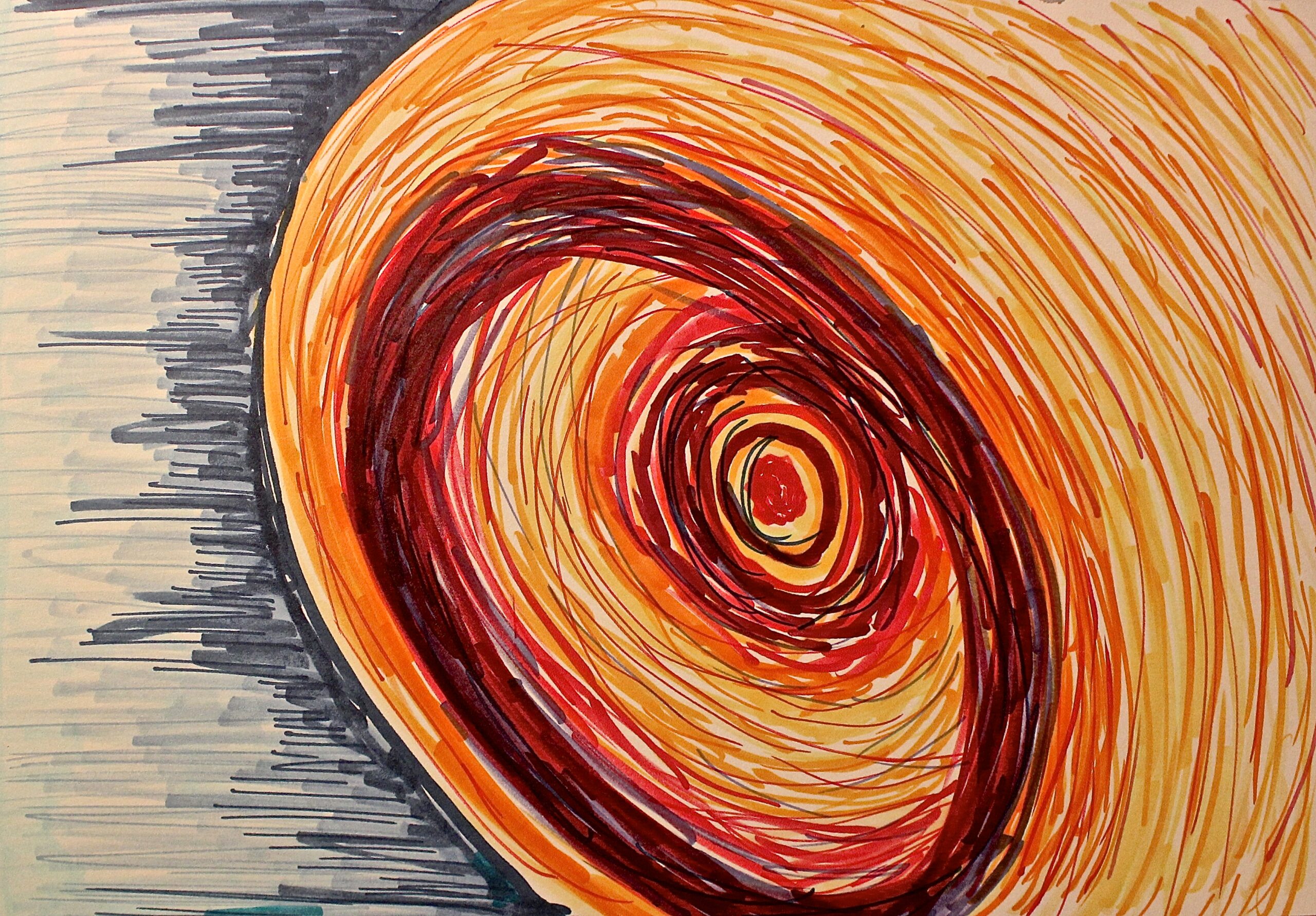David Foster Wallace’s chart is the portrait of a mind forged in crystal and iron. Thought was destiny. His Mercury, ruler of both the Moon and the Ascendant, was itself ruled and joined by a fierce Saturn domiciled in Aquarius in the ninth house – domus Dei -, binding soul and flesh to the discipline of the mind, attempting to scrutinize the invisible via grammar. Everything he felt or created passed through that saturnine syntax, a light so lucid it ultimately became a prison.
I. The Sky of Language
Mercury is at 8° Aquarius, a fixed Air sign, in the ninth house, the Domus Dei, territory of higher mind and broad vision. It is in diurnal sect, a condition that favours it, since the Sun in Pisces is angular and strong in the tenth house, being the predominator of the chart.

The separating conjunction with domiciled Saturn is the key aspect: Saturn is Mercury’s essential and accidental ruler, controlling his way of thinking, his mental grammar, the rhythm of reasoning. In turn, Mercury is the nocturnal ruler of the Air triplicity, and so technically competent, but trapped within Saturnine strucutre.
The Venusian bound and decan of Mercury add an aesthetic and seductive hue to the mind. Although exalted in Pisces, Venus is combust by the Sun and out of sect: pleasure, tenderness, art exist, but they burn too close to the Sun, unable to express itself freely.
From the sixth house, retrograde Neptune in Scorpio forms a direct and applying square to Mercury and Saturn in Aquarius, releasing a subterranean current of dissolution into the very core of the mental structure. The sixth house, one of the shadow houses for lacking a Pythagorean aspect to the Ascendant, operates here as a zone of blindness and consumption: what dwells within it acts unseen.
Having Scorpio on this house doubles the emotional density, fixing Water in a subterranean, heavy, almost corrosive state. The ruler of Neptune in this chart is Mars, also in Aquarius in the ninth house, is out of sect, peregrine, and cadent, with no direct aspect to his own regent, although still bound by the square of sign. The very mediator of tension – Mars – witnesses the conflict between Mercury/Saturn and Neptune without the power to resolve it. The result is a permanent friction between the fixed Air of abstraction and the fixed Water of emotional intensity, a tension that traps the intellect in a cycle of clarity and collapse.
In the same ninth house, there is therefore a stellium of Saturn, Mercury, Mars, and Jupiter, along with the Medium Coeli. This creates a rare point of intellectual condensation: all the mental and ideological planets (Mercury, Saturn, Jupiter – the latter the oikodespostes) coexist with the combative impulse of Mars and the social aim of the MC.
Below, the Moon in Virgo in the fourth house stands isolated, almost without aspects, ruled by Mercury himself. This makes her a silent mirror: she feels through analysis and loves through grammar. Finally, the Gemini Ascendant seals the chart with Mercurial signature. Consciousness and physical form coincide with language. The body is discourse.
Hence a chart dominated by Air and Earth, of rationality and structure, where the fixed and invisible Water of Scorpio seeps through the foundations, turning lucidity into fever.
II. The God of Clarity and the Prison of the Sign
Aquarius is fixed Air, crystallized intellect, the place where thought becomes pure form, almost mineral. It is the sign of distant gods and geometric angels.
God of movement and translation, Mercury, when in Aquarius and joined with Saturn, loses his lightness: he becomes the scribe of stone. He translates, but translates the ineffable into structures so perfect they suffocate.
In sect and domiciled, Saturn acts here as an archon of thought, imposing boundaries on Mercurial fluidity. The mind becomes moral and discourse turns into law. And, yet, being in Venusian bound and decan, there is a nostalgia for lost beauty. Every line of Wallace is an attempt to reconcile rigor and love, form and ecstasy, as if the word could save the feeling life cannot sustain.
However, the square with Mercury and Saturn makes two enclosed worlds collide: the rational mind and the subterranean emotion. Thought wants to crystallise meaning but instinct comes forth to dissolve it. Hence the paradox: the more Wallace thinks, the more thought devours him.
The outcome is a divided consciousness: Mercurial-Saturnine clarity above, Neptunian swamp below. Intelligence becomes an instrument of purification and a torment: it seeks order within chaos, but chaos infiltrates the very method itself.
The Moon in Virgo in the fourth house is the psyche embodied in detail. She represents the soul that looks at the ground instead of the sky, the emotional instinct that prefers to order rather than to feel. Ruled by Mercury, it is as if emotion itself had been transformed into a logical process. Pain is mostly experienced as a thought.
The whole configuration expresses the archetype of the Orphic intellect: the Spirit imprisoned in the labyrinth of language, trying through form to free itself from form. It is the gnostic drama of thought that recognises the world as illusion, but cannot stop describing it.
III. Writing as Expiation
In life, this conjunction of Mercury and Saturn manifests as the mind that thinks about its own thinking, the vice of metaconsciousness. He observes language, but also observes the act of observing, generating an infinite regression. It is a chart of lethal self-awareness: the subject perceives the mechanism of reality so thoroughly that he can no longer inhabit it innocently.
Mercury and Saturn build the tower of reasoning, but Neptune, from the foundations, lets in the water. Lucidity becomes a feverish state of mind and thought an act of resistance against dissolution.
The Moon in Virgo demands purification. Every page written is an attempt at cleansing, an exorcism of emotional confusion. But the combustion of Venus makes love, empathy, and spiritual surrender burn before touching the world. Love turns into irony; pity into lucidity; desire into syntax. On the operative level, Wallace lived the destiny of a Mercury–Saturn governing the entire chart: the man who uses writing as a priestly function. He offered language as sacrifice.
Κύριε ελέησον
